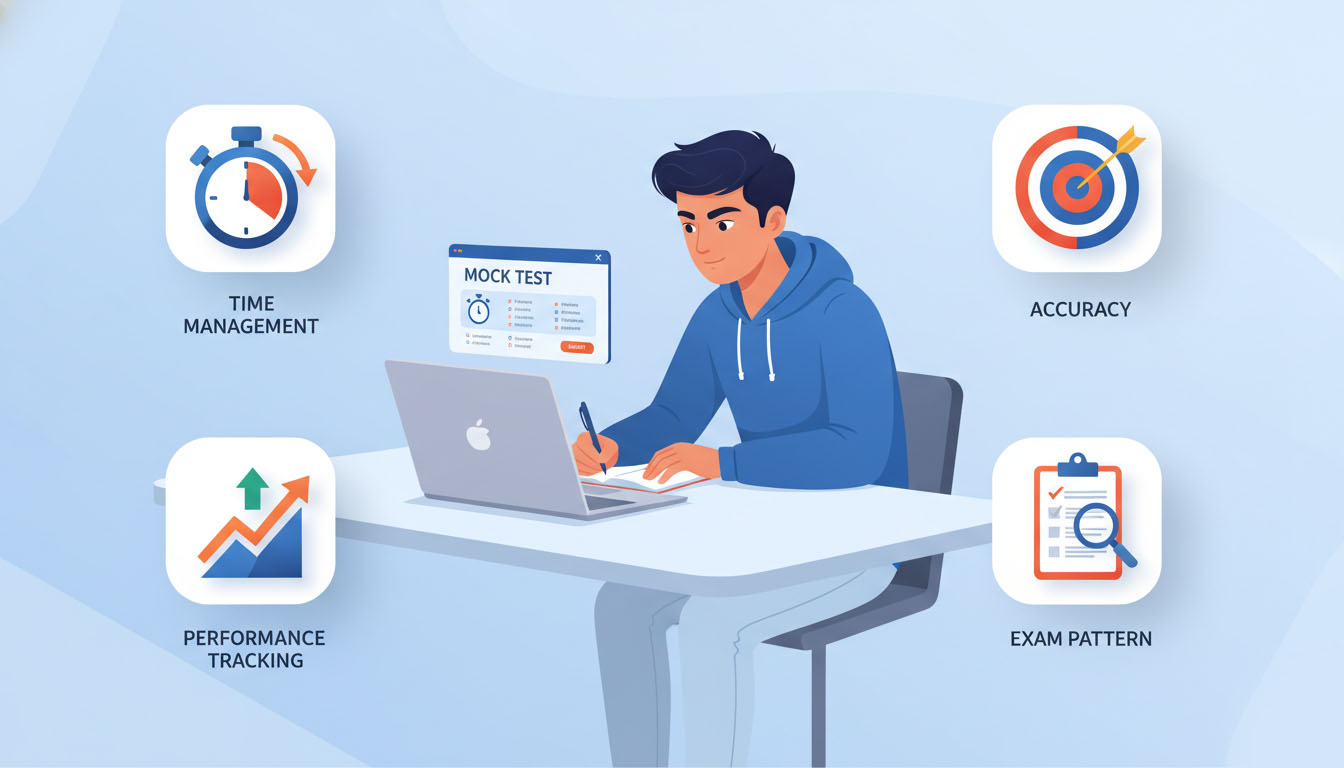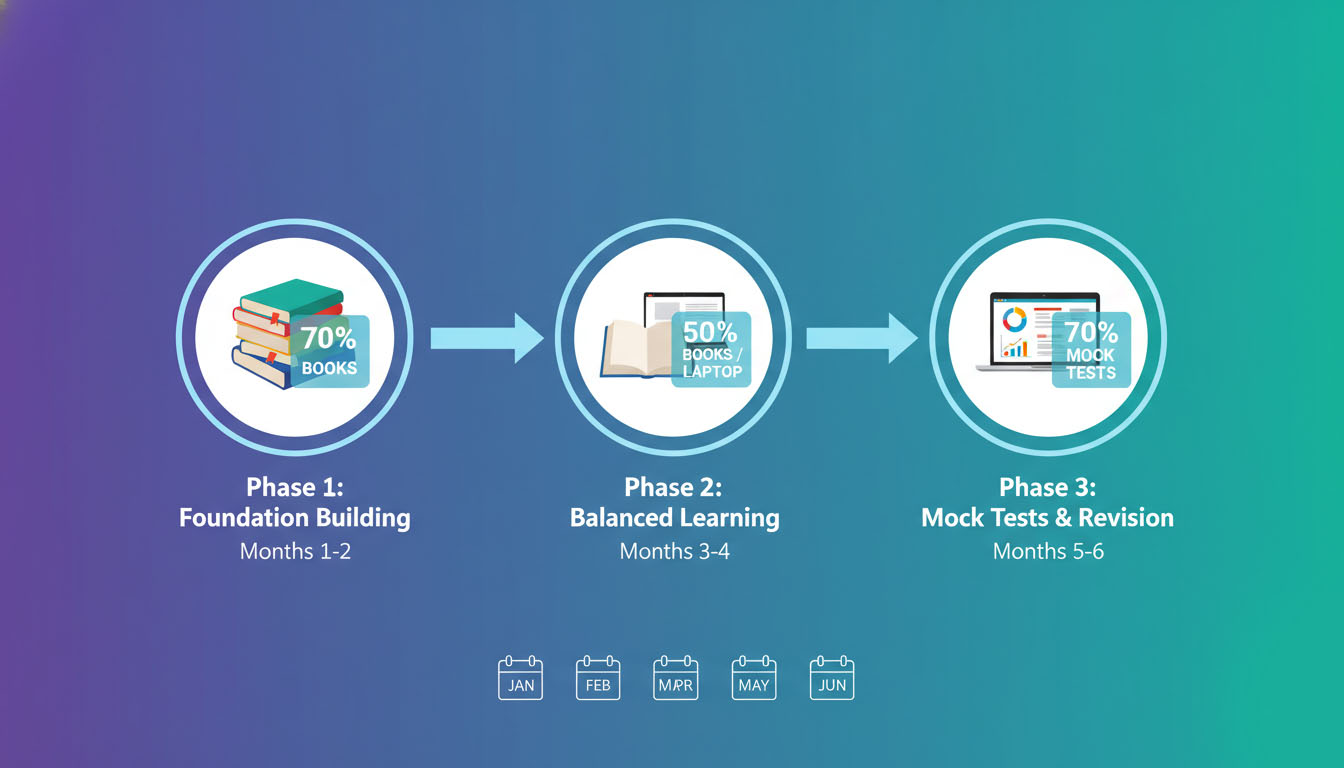Every year, over 2.5 crore aspirants appear for various government exams across India, with success rates just around 1-3% for the positions. This competition raises a crucial question for every aspirant: Should you rely on traditional practice books or invest your time in a mock test series? While 73% of successful candidates report using both methods, understanding which approach works better at different stages of your preparation can significantly improve your chances of cracking the government exams.
This guide will help you make an informed decision about Mock Tests vs. Books and create a preparation strategy.
Key Takeaways
Based on the Mock Tests vs. Books analysis, here are essential insights every government exam aspirant should implement:
- Use books for initial learning (1-6 months of preparation) and gradually increase mock test frequency as exams approach. In the final 2-3 months, mock tests should dominate your schedule.
- Dedicate 70% time to understanding concepts through books and CUET study material initially, then flip to 70% practice test time when exams are closer.
- Don't attempt random mock tests. Choose a reputable test series that closely matches the latest exam pattern and eligibility criteria of your target exam.
- Every mock test must be followed by a thorough analysis. Identify your strengths and weaknesses, understand the concepts behind wrong answers, and note the time spent per question.
- Use the previous year's question paper collections alongside books. Solve these papers in timed conditions to understand actual exam difficulty.
Understanding the Battle: Mock Tests vs. Books
The debate between Mock Tests vs. Books isn't about choosing one over the other; it's about understanding their unique roles in your exam preparation journey.
Books offer coverage of the syllabus, detailed explanations, and structured learning paths. They're your primary source for understanding concepts, theories, and building foundational knowledge. On the other hand, taking mock tests regularly transforms this theoretical knowledge into practical problem-solving abilities.

Benefits of Mock Tests for Government Exam Aspirants
Real-Time Exam Simulation and Pattern Familiarization
When you take mock tests, you experience the actual exam environment without the pressure. This familiarity with the CUET exam pattern, SSC format, or RRB structure reduces anxiety and builds confidence.
Speed and Accuracy Enhancement
Research shows that regular practice through test series can improve your solving speed by 40-60% within 8-12 weeks. Mock tests train you to make quick decisions, especially important for exams with negative marks, where accuracy is as important as speed.
Identifying Weak Areas and Strength Assessment
One of the most significant advantages of mock tests is the detailed performance analysis you receive. After attempting a mock test, you can review mock test results to pinpoint exactly which topics or question types challenge you the most.
Time Management Mastery
A typical SSC CGL exam gives you approximately 50 seconds per question. Mock tests teach you to allocate time strategically across sections, ensuring you don't get stuck on difficult questions while easier ones remain unattempted.
Adapting to the Latest Exam Pattern and Marking Scheme
The CUET exam pattern for 2025 has undergone revisions that only updated mock tests reflect. Practice questions from the best study material providers ensure you're preparing for the current format, not outdated versions.

Benefits of Books and Traditional Study Material
Comprehensive Coverage and In-Depth Understanding
Quality practice books provide good coverage of the CUET syllabus or any government exam syllabus with detailed explanations. They offer the depth necessary for building a strong conceptual foundation. Books break down complex topics into examples and illustrations.
Structured Learning Path
Books follow a sequence from basic to advanced concepts. This structured approach is particularly valuable for beginners who need guidance on what to study and in what sequence. A well-designed textbook serves as your roadmap through the vast syllabus of government exams.
Reference Material for Revision
Unlike digital resources, physical books allow for easy annotation, highlighting, and quick reference during revision. Many aspirants find that writing notes and creating bookmarks helps with retention and last-minute revision.
Reduced Screen Time and Better Focus
In an age of digital distractions, traditional books offer focused study sessions without notifications or to switch tabs. This distraction-free learning environment can significantly improve concentration and information retention.
The Smart Approach: Combining Both Methods Strategically
The most successful government exam aspirants don't choose between Mock Tests vs. Books: they combine both methods to maximize their preparation efficiency.
Phase 1: Foundation Building (4-6 months before exam)
During this phase, prioritize CUET study material, best study material books, and standard textbooks for your target exam. Focus on:
- Reading and understanding concepts thoroughly
- Creating comprehensive notes
- Solving end of the chapter exercises and practice questions
- Studying previous year's question papers to understand the difficulty level
Phase 2: Application and Practice (2-4 months before exam)
Shift your focus toward applying what you've learned:
- Increase mock test frequency to 2-3 per week
- Analyze mock test results in a detailed manner to identify patterns
- Return to books only for topics where you're consistently weak
- Practice sample papers and sectional tests
- Focus on improving speed and accuracy metrics
Phase 3: Exam Readiness (Final 2 Months)
In the final stretch, mock tests should dominate your study plan:
- Attempt full-length mock tests under strict exam conditions 3-4 times per week
- Focus on test series that match the latest exam pattern
- Review correct answers and understand why the wrong options are incorrect
- Use books only for quick revision and clarification of doubts
- Practice with the previous year's question papers extensively

Practical Tips for Government Exam Aspirants
- Choosing the Right Mock Test Platform
- Selecting Quality Study Material
- Creating an Effective Study Plan
Avoiding Common Pitfalls
Many aspirants make these mistakes:
- Over-relying on books without enough practice
- Taking too many mock tests without analysis
- Ignoring negative marking strategies
- Not tracking progress systematically
Conclusion
The question isn't really about Mock Tests vs. Books: it's about using both strategically at the right time in your preparation journey. Successful government exam aspirants understand that exam preparation requires both theoretical understanding from the best study material and practical application through regular test series.
Start your preparation with quality books to build a solid foundation, then progressively increase mock test frequency as the exam approaches. Whether you're targeting the Common University Entrance Test, SSC, Railway, or any state-level entrance exam, the winning formula remains the same: learn from books, practice through mocks, analyze relentlessly, and adapt continuously.
